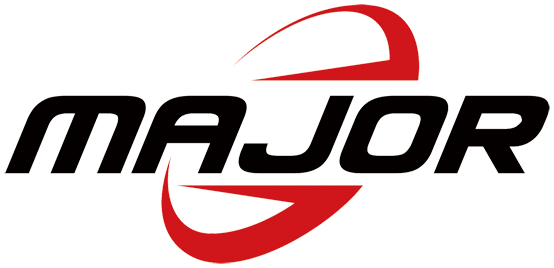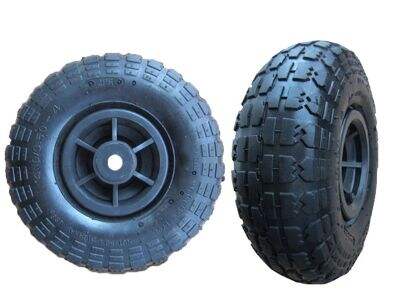Υπάρχουν δύο τύποι ράδιων που μπορεί να θέλετε να λάβετε υπόψη σας όταν επιλέγετε ράδια για τα ηλεκτροσυσκευαστικά σας: ράδια από στερεό φουστάκι και πνευματικά ράδια. Κάθε τύπος έρχεται με τις δικές του πλεονεκτίες και μειονεκτίες, και η επιλογή του σωστού μπορεί να έχει σημαντική επίδραση στην απόδοση της οπλοστασίας σας. Ας συζητήσουμε τα ράδια από στερεό φουστάκι και τα πνευματικά ράδια σε αυτή την καθοδήγηση. Θα εξετάσουμε τις πλεονεκτίες και τις μειονεκτίες κάθε ένα για να σας καθοδηγήσουμε στην καλύτερη απόφαση για τις συγκεκριμένες ανάγκες σας.
Ράδια από στερεό φουστάκι vs πνευματικά ράδια
Τα ράδια από στερεό φουστάκι δεν έχουν καμία αδυναμία, είναι απλώς στερεή ισχύς. Κατασκευάζονται με πυκνό υλικό, χωρίς την ανάγκη για αέρα μέσα, έτσι δεν είναι ευάλωτα σε κοπές και δεν διαρρεύουν εύκολα. Αυτή η ασπροποδή κατασκευή αποτελεί τα ράδια από στερεό φουστάκι Ροδάκινα για γεωργική μηχανή να κρατάει καλά για μεγάλες περιόδους χρήσης, ακόμη και σε δύσκολες συνθήκες όπου άλλα τροχοί σπάζουν ή εξοδεύονται γρήγορα. Είναι επίσης εξαιρετικοί όταν φέρουν βάρος και είναι τέλειοι για τη χρήση εξωτερικά, ειδικά σε ασύλληπτα και ανισά τραπέζια που μπορεί να προκαλέσουν προβλήματα σε πιο ευαίσθητους τροχούς.
Αντιθέτως, οι πνευματικοί τροχοί κατασκευάζονται διαφορετικά. Αποτελούνται από μπουτύλ, με εσωτερικά αεροπληρωμένα αγγεία. Αυτή η σχεδίαση τους κάνει μαλακότερους και βοηθά να προσφέρουν πιο άνετη καταδρομή, καθώς μπορούν να απορροφούν τις κούρες και τις τριλλήσεις του δρόμου. Αυτό είναι ειδικά χρήσιμο για τη μεταφορά πραγμάτων μέσω ανισών επιφανειών. Θα πρέπει να σημειωθεί ότι οι πνευματικοί τροχοί μπορούν να έχουν διάρροιες ή κενά πολύ εύκολα σε σύγκριση με Στερεό ΚΑΟΥΤΣΟΥΚ Τροχός . Αυτό μπορεί να είναι πρόβλημα και μπορεί ακόμη και να οδηγήσει σε πρόσθετες δαπάνες όταν σταματήσουν να λειτουργούν.
Διαχείριση και Κυριαρχία
Διαχείριση: Ένα από τα κύρια πλεονεκτήματα είναι πνευματικός τροχός είναι η εύκολη διαχείριση. Επιλέγονται σκοπευμένα να είναι πιο ευέλικτοι και μπορούν να βοηθήσουν να στρέφονται καλύτερα για την ασκήση σε μικρά χώρα ή περιοχή με πολλά εμπόδια. Τα πνευματικά τροχιά θα φτάσουν μακριά αν πρέπει να περάσετε πάνω από αντικείμενα ή μέσα και έξω από ασυγχρόνιες θέσεις. Αλλά είναι πιο ευαίσθητα από τα τροχιά από στερεο αυτοκινητιστικό πλαστικό. Πρέπει να τα ελέγχετε συχνά για να βεβαιωθείτε ότι τα φυσιμένα στοιβάκια δεν είναι κατάλληλα ντυμένα και σε καλή κατάσταση.
Στο μειονέκτημα, τα τροχιά από στερεο αυτοκινητιστικό πλαστικό είναι εξαιρετικά χαμηλής επισκευής. Δεν χρειάζεται αέρα, οπότε δεν χρειάζεται να τα ελέγχετε ή να τα ντυμαίνετε. Αυτό είναι ένα μεγάλο πλεονέκτημα σε εφαρμογές όπου είναι δύσκολο να πραγματοποιείτε κανονική επισκευή. Τα τροχιά από στερεο αυτοκινητιστικό πλαστικό μπορούν να φέρουν βαριά φορτία με ευκολία, κάνοντάς τα ένα εξαιρετική επιλογή για εργασίες σε βιομηχανικά εργοστάσια ή σε μέρη που απαιτούν ισχυρή απόδοση και χαμηλή επισκευή.
Αγκύλωση σε ασύμφωνο έδαφος
Τα στερεά κάλοι από μύλο είναι εξαιρετικοί για την προσαρμογή. Αν πάμε από RBMM σε SRMM χρειαζόμαστε μικρές σχίσεις. Αυτό είναι σημαντικό για τη μεταφορά βαρών, καθώς τους επιτρέπει να διασχίζουν ασύμφωνο έδαφος χωρίς να χάνουν ισορροπία. Οι στερεοί κάλοι από μύλο είναι οιδικοί ως κάλοι εξωτερικής χρήσης σε μέρη όπως αγροκτήματα και εργοστάσια κατασκευής, όπου η σταθερότητα και η υποστήριξη είναι απαραίτητες.
Οι πνευματικοί κάλοι, παρά τα οφέλη τους, δεν είναι τόσο σταθεροί όσο οι στερεοί κάλοι από μύλο. Έχουν περισσότερο μύλο ψυχής, αλλά οι προσαρμογές τους φτιάχνονται με μια μαλακότερη στρώση που μπορεί να τους κάνει καλύτερους για προσαρμογή σε διαφορετικά επιφάνεια— κυρίως χόρτο ή βράσμα. Ωστόσο, είναι πιο προσκλινόμενοι να γλιστρώνουν όταν χρησιμοποιούνται σε ασύμφωνα ή άνισα επιπέδα, που μπορεί να είναι πρόβλημα αν χρειάζεστε να παραμένετε υπό έλεγχο.
Επανδρική κατανάλωση και αξιοπιστία
Η μεγαλύτερη προβάδιση των κυκλών με δισκευτικά πneυματικά είναι ότι μπορούν να απορροφήσουν κύβαλα και σαλες. Τα πneυματικά τους, που γεμίζονται με αέρα, τους δίνουν την ικανότητα να απορροφούν τα κύβαλα και τις σαλες, έτσι ώστε να είναι μια καλή επιλογή για τη μεταφορά πραγμάτων σε τραγούδια ή καρούβες. Αυτή η λειτουργία εξασφαλίζει ελάχιστη βλάβη στα πράγματα που μεταφέρετε, κάτι πολύ σημαντικό όταν ασχολείστε με ευαίσθητα αντικείμενα.
Παρά τις μεγάλες αυτές προβάδισεις, οι πneυματικοί κύκλοι δεν είναι τέλειοι. Οι πneυματικοί κύκλοι: Αυτοί οι κύκλοι προσφέρουν αμορφισμό και αγκύλωση, αλλά είναι επίσης πιο ευάλωτοι σε ξύσματα και διαρροές. Η αποτυχία ενός συστήματος είναι μια από τις πιο απρακτικές μορφές διακοπής, καθώς έρχεται με ώρες και ακριβές επισκευή που πρέπει να διορθωθούν σε στενό χρονοδιάγραμμα (εργασιακές ώρες, κλειστά στα τελεutaτά). Οι κύκλοι από στερεό πλάστικο μπορεί να μην προσφέρουν μια τόσο ήπια βάση, αλλά τείνουν να είναι μια πιο αξιόπιστη επιλογή συνολικά, έτσι ώστε είναι καλοί αν χρειάζεστε αξιοπιστίa.
Καλύτερες χρήσεις για κάθε τύπο
Αλλά για όλες τις εφαρμογές βαρέων εργασιών, τα στερεά κυμβάλια από μύλη είναι τα καλύτερα. Σχεδιάστηκαν για να αντιμετωπίζουν με εύνοια τις δύσκολες εργασίες. Μπορούν να αντιμετωπίσουν άνισα έδαφος και μεγάλα βάρη, κάτι πολύ σημαντικό για εξωτερικές εργασίες όπως η κατασκευή και η γεωργία. Επιπλέον, ένα στερεό κύμβαλο από μύλη απαιτεί ελάχιστη συντήρηση, μια μεγάλη πλειονεκτία όταν το έργο δεν μπορεί να σταματήσει.
Ενώ τα πνευματικά κύμβαλα είναι πιο κατάλληλα για ελαφρές φορτίες και εσωτερική χρήση. Είναι εξαιρετικά για τη μετακίνηση πραγμάτων σε κάρτες ή κολιές, σε ομαλές και πεπλατωμένες επιφάνειες. Προσφέρουν μια μαλακύτερη βίβλη, μια ωραία ιδιότητα όταν μετακινείτε αντικείμενα που απαιτούν μερική φροντίδα. Θυμηθείτε όμως ότι τα πνευματικά κύμβαλα απαιτούν περισσότερη συντήρηση σε καλά ντυμένα φουσκωτά στοιβάκια και λειτουργία.
 EN
EN
 AR
AR
 BG
BG
 HR
HR
 CS
CS
 DA
DA
 NL
NL
 FI
FI
 FR
FR
 DE
DE
 EL
EL
 HI
HI
 IT
IT
 JA
JA
 KO
KO
 NO
NO
 PL
PL
 PT
PT
 RO
RO
 RU
RU
 ES
ES
 SV
SV
 TL
TL
 ID
ID
 LV
LV
 LT
LT
 SR
SR
 SK
SK
 UK
UK
 VI
VI
 HU
HU
 MT
MT
 TH
TH
 TR
TR
 MS
MS
 GA
GA
 KA
KA
 LA
LA
 NE
NE
 UZ
UZ

